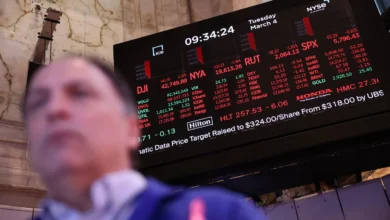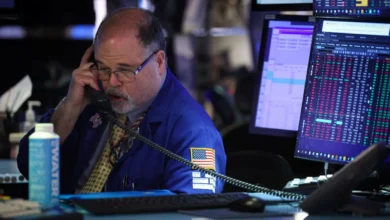BlackRock CEO Larry Fink: Blending public and private markets is a ‘great investment’ for retirement
- Major asset managers and plan providers want to increase the share of private assets in the $12.5 trillion workplace retirement plan market.
- Private assets, which can include credit and equity in private, not public firms, can offer higher returns, but with greater volatility.
- BlackRock CEO Larry Fink says a “blend” of public and private markets has been a “great investment” for many institutions.
Private assets currently account for less than 1% of assets in 401(k)s and other defined contribution plans, but some major asset managers and plan administrators want to increase that share.
“We are seeing institutions worldwide blend public and private markets, and in many cases, it’s been a great investment,” said Larry Fink, chairman and CEO of BlackRock, at a summit on retirement that the company sponsored last week. More than half of the $11.6 trillion in assets under management at BlackRock are in retirement products.
Fink and other proponents say a key reason for including private assets in the $12.5 trillion workplace retirement plan market is the need for greater portfolio diversification.
Over the last 20 years, the number of publicly traded companies has declined as firms backed by private equity have grown. In the U.S., about 87% of companies with annual revenues of more than $100 million are now private, according to the Partners Group, a Swiss-based global private equity firm.
“So, how do we give 128 million Americans in the defined contribution system exposure to those asset classes?” asks Ed Murphy, CEO of Empower, the second-largest U.S. retirement services company, which administers 88,000 retirement plans.
Murphy, whose company serves 19 million individual investors, supports efforts to add private assets to retirement plans as part of a target-date fund, managed account or collective investment trust fund rather than a “stand-alone” investment.
“There’s a lot of good work being done in the industry on bringing this together in a way that makes sense, and hopefully it gets employers comfortable,” he said.
Private equity comes with ‘greater risk’
Yet, for many plan sponsors to feel secure about investing in private assets, several challenges must be addressed, including high fees, transparency of the assets, liquidity risk and increased volatility.
“Private equity can pay higher returns than traditional public market investments, of course, with greater risk for retirement savers. This could offer an opportunity for higher growth for their assets, but it would mean more exposure to volatility, which is probably not ideal for people nearing retirement,” said Olivia Mitchell, a professor of business economics and public policy at the University of Pennsylvania and executive director of the Pension Research Council.
Employers offering 401(k) plans also must act as fiduciaries, meaning they are required to serve the best interests of the plan participants, not themselves.
Plan sponsors are responsible for financial education, which some experts say may be challenging in explaining less-well-known investments.
“If they don’t understand what they’re buying, they shouldn’t be in it,” said Robert Burnette, a financial advisor and CEO of Outlook Financial Center in Troy, Ohio.
Employers have to select and monitor investment options, ensure that fees are reasonable and provide participants with enough information to make informed decisions about their retirement savings.
Earlier this month, BlackRock completed its acquisition of Preqin, a provider of private market information. Fink says the company plans to build out its analytics to provide transparency and help investors understand risk in the private markets.
“If we could do that, we could then go to our regulators, whether it’s the [Department of Labor] or the [Securities and Exchange Commission], depending on where we are trying to expand the investment opportunities and prove to them, show to them that these can be sensible instruments for a retirement product,” Fink said.
“Our job is to be providing a much better transparency and analytics to get that done,” he added. “If we achieve that, then I think we’re going to have a credible opportunity to add these types of instruments to retirement products.”




